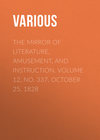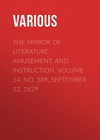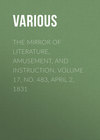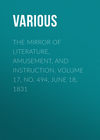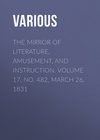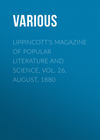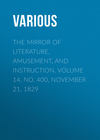Czytaj książkę: «The Mirror of Literature, Amusement, and Instruction. Volume 12, No. 337, October 25, 1828», strona 6
CURSES OF ABSENTEEISM
What is the condition of the country-seat of the absentee proprietor? The mansion-house deserted and closed; the approaches to it ragged and grass grown; the chimneys, "those windpipes of good hospitality," as an old English poet calls them, giving no token of the cheerful fire within; the gardens running to waste, or, perchance, made a source of menial profit; the old family servants dismissed, and some rude bailiff, or country attorney, ruling paramount in the place. The surrounding cottagers, who have derived their support from the vicinage, deprived of this, pass into destitution and wretchedness; either abandoning their homes, throwing themselves upon parish relief, or seeking provision by means yet more desperate. The farming tenantry, though less immediately dependent, yet all partake, more or less, in the evil. The charities and hospitalities which belong to such a mansion lie dormant; the clergyman is no longer supported and aided in his important duties; the family pew in the church is closed; and the village churchyard ceases to be a place of pleasant meeting, where the peasant's heart is gladdened by the kindly notice of his landlord.
It is the struggle against retrenchment, the "paupertatis pudor et fuga," which has caused hundreds of English families, of property and consideration, to desert their family places, and to pass year after year in residence abroad. At the close of each London season, the question too often occurs as to the best mode of evading return to the country; and the sun of summer, instead of calling back the landlord to his tenants, and to the harvests of his own lands, sends him forth to the meagre adventures of continental roads and inns.—Quarterly Rev.
SOLILOQUY
THE KING OF DARKNESS
On the Fallen Angels
They're gone to ply their ineffectual labour,—
To sow in guilt what they must reap in woe,—
Heaping upon themselves more deep damnation.
Thus would I have it.—Little once I thought,
When leagued with me in crime and punishment
They fell,—condemned to an eternity
Of exile from all joy and holiness—
And the first stains of sinfulness and sorrow
Fell blight-like o'er their cherub lineaments—
Myself the cause—Albeit too proud for tears,
Yet touch'd with their sad doom, I little thought
I e'er should hate them thus.—Yet thus I hate them,
With all that bitter agony of soul
Which is the punishment of fiends. Alas!
It was my high ambition, to hold sway,
Sole, paramount, unquestion'd, o'er a third
Of Heaven's resplendent legions:—Power and glory
Dwelt on them, like an elemental essence
That could not be destroyed.—I could not deem
That aught could so extinguish the pure fire
Of their sun-like beauty—yet 'tis changed!—
I gain'd them to my wish, and they are grown
Too hateful to be look'd on.—Thus I've seen
The frail fair dupe of amorous perfidy,
The victim of a smile,—by man beguiled—
Won to debasement, and then left in loathing:—
Alas! I cannot leave my fatal conquest!—
Man! would I were the humblest mortal wretch,
That crawls beneath yon shadowing temple's tower,
Under the sky of Canaan; so I might
Lay down this weight of sceptred misery,
And fly for ever from myself and these!
But Pride reproves the wish; and—it is useless;
The unatonable deeds of ages rise
Like clouds between me and the throne of Grace.
I may not hope,—or fear,—still unsubdued,
As when I ruled the anarchy of Heaven,
I stand in Fate's despite,—firm and impassive
To all that Chance, and Time, and Ruin bring.
—In that disastrous day, when this vast world
Shall, like a tempest-shaken edifice,
Rock into giant fractures—as the sound
Of the Archangel's trump, upon the deep,
Bids fall the bonds of nature, to let forth
Destruction's formless fiend from world to world,
Trampling the stars to darkness,—Even then,
Like that proud Roman exile, musing o'er
The dust of fallen Carthage, I shall stand,
Myself a solemn wreck, calm and unmoved
Among the ruins of the works of God.
And my last look shall be a look of triumph
O'er the fallen pillars of the deep and sky;
The wreck of nature by my deeds prepared—
Deeds—which o'erpay the power of Destiny.
Blackwood's Magazine
THE GATHERER
"A snapper-up of unconsidered trifles."
SHAKSPEARE.
ON A PICTURE OF HERO AND LEANDER
By T. Hood
Why, Lover, why
Such a water-rover?
Would she love thee more
For coming half seas over?
Why, Lady, why
So in love with dipping?
Must a lad of Greece
Come all over dripping?
Why, Cupid, why
Make the passage brighter?
Were not any boat
Better than a lighter?
Why, Maiden, why
So intrusive standing?
Must thou be on the stair,
When he's on the landing?
The Gem
On a tombstone in the churchyard of Christchurch, Hants, is the following curious inscription, which I copied on the spot. Perhaps some of your numerous readers can explain the same:—
WE WERE NOT SLAYNE BVT RAYSD
RAYSD NOT TO LIFE
BVT TO BE BVRIED TWICE
BY MEN OF STRIFE
WHAT REST COVLD'TH LIVING HAVE
WHEN DEAD HAD NONE
AGREE AMONGST YOV
HERE WE TEN ARE ONE
HEN: ROGERS DIED APRILL 17, 1641.
I R.
EPICURISM
Thomas a Becket gave five pounds, equivalent to seventy-five pounds of the present money, for a dish of eels.
HALBERT H
A famous scholar of the last century, when a boy, was exceedingly fond of the Greek language, and after he had been a short time at school, had acquired so much of the sound of the language, that when at home at dinner one day his father said, "Shall you not be glad, Harry, when you can tell me the names of every dish on the table in Greek?" "Yes," said he; "but I think I know what it must be." "Do you?" said the father; "what do you know about Greek?"—"Nothing," said the boy; "but I think I can guess from the sound of it what it would be." "Well, say then," said the father. He quickly replied, "Shouldromoton, alphagous, pasti-venizon." It appears the dinner consisted of a shoulder of mutton, half a goose, and venison pasty.
SNUFF AND TOBACCO
In the year 1797, was circulated the following proposals for publishing by subscription, a History of Snuff and Tobacco, in Two Volumes:—
Vol. 1.—To contain a description of the nose—size of noses—a digression on Roman noses—whether long noses are symptomatic—origin of tobacco—tobacco first manufactured into snuff—inquiry who took the first pinch—essay on sneezing—whether the ancients sneezed, and at what—origin of pocket handkerchiefs—discrimination between snuffing and taking snuff; the former only applied to candles—parliamentary snuff-takers—troubles in the time of Charles I. as connected with smoking.
Vol. 2.—Snuff-takers in the parliamentary army—wit at a pinch—oval snuff-boxes first used by the roundheads—manufacture of tobacco pipes—dissertation on pipe-clay—state of snuff during the commonwealth—the union—Scotch snuff first introduced—found very pungent and penetrating—accession of George II.—snuff-boxes then made of gold and silver—George III.—Scotch snuff first introduced at court—the queen, German snuffs in fashion—female snuff-takers—clean tuckers, & c. &c—Index and List of Subscribers.
C.F.E
THE "ILL WIND," &c
In debt, deserted, and forlorn,
A melancholy elf
Resolved, upon a Monday morn,
To go and hang himself.
He reach'd the tree, when lo! he views
A pot of gold conceal'd;
He snatch'd it up, threw down the noose,
And scamper'd from the field.
The owner came—found out the theft,
And, having scratch'd his head,
Took up the rope the other left,
And hung himself, instead.
OLD COOKERY
Gastronomers will feel a natural desire to know what was considered the "best universal sauce in the world," in the boon days of Charles II., at least what was accounted such, by the Duke of York, who was instructed to prepare it by the Spanish ambassador. It consisted of parsley, and a dry toast pounded in a mortar, with vinegar, salt, and pepper. The modern English would no more relish his royal highness's taste in condiments than in religion. A fashionable or cabinet dinner of the same period consisted of "a dish of marrow-bones, a leg of mutton, a dish of fowl, three pullets, and a dozen larks, all in a dish; a great tart, a neat's tongue, a dish of anchovies, a dish of prawns, and cheese." At the same period, a supper-dish, when the king supped with his mistress, Lady Castlemaine, was "a chine of beef roasted."
OLD EPITAPH
As I was, so are ye,
As I am, you shall be.
That I had, that I gave,
That I gave, that I have.
Thus I end all my cost,
That I left, that I lost.
IMPROMPTU TO –, ON HER MARRIAGE WITH MR. WILLIAM P–
When ladies they wed,
It ever is said
That their freedom away they have thrown;
But you've not done so,
For we very well know
You will have a Will of your own.
C.K.W
PAINTERS
Lavater affirms, that no one whose person is not well formed can become a good physiognomist. Those painters were the best whose persons were the handsomest. Reubens, Vandyke, and Raphael possessed three gradations of beauty, and possessed three gradations of painting.
ELYSIAN SOUP
The French have a soup which they call "Potage a la Camerani" of which it is said "a single spoonful will lap the palate in Elysium; and while one drop remains on the tongue, each other sense is eclipsed by the voluptuous thrilling of the lingual nerves!"
A JAPANESE BEAUTY
Her face was oval, her features regular, and her little mouth, when open, disclosed a set of shining, black lacquered teeth; her hair was black, and rolled up in the form of a turban, without any ornament, except a few tortoiseshell combs; she had sparkling, dark eyes, was about the middle size, and elegantly formed; her dress consisted of six wadded silk garments, similar to our night-gowns, each fastened round the lower part of the waist by a separate band, and drawn close together from the girdle downwards; they were all of different colours, and the uppermost was black.
U
GOOD LIVING
I hate a fellow who was never young; he is like a dull Italian year, where the trees are always in leaf, and when the only way of knowing the difference of the seasons is by referring to an almanack. The inconstancy of the spring may surely be excused for the steady warmth of summer and the rich plenty of autumn; then comes the hoar of winter old gentleman, and closes the scene not ungracefully.—Old Play.
Purchasers of the MIRROR, who may wish to complete their sets are informed, that every volume is complete in itself, and may be purchased separately. The whole of the numbers are now in print, and can be procured by giving an order to any Bookseller or Newsvender.
Complete sets Vol I. to XI. in boards, price £2. 19s. 6d. half bound, £3. 17s.
LIMBIRD'S EDITIONS
CHEAP and POPULAR WORKS published at the MIRROR OFFICE in the Strand, near Somerset House.
The ARABIAN NIGHTS' ENTERTAINMENTS, Embellished with nearly 150 Engravings. Price 6s. 6d. boards.
The TALES of the GENII. Price 2s.
The MICROCOSM. By the Right Hon. G. CANNING. &c. Price 2s.
PLUTARCH'S LIVES, with Fifty Portraits, 2 vols. price 13s. boards.
COWPER'S POEMS, with 12 Engravings, price 3s. 6d. boards.
COOK'S VOYAGES, 2 vols. price 8s. boards.
The CABINET of CURIOSITIES: or, WONDERS of the WORLD DISPLAYED Price 5s. boards.
BEAUTIES of SCOTT, 2 vols. price 7s. boards.
GOLDSMITH'S ESSAYS. Price 8d.
DR. FRANKLIN'S ESSAYS. Price 1s. 2d.
BACON'S ESSAYS Price 8d.
SALMAGUNDI. Price 1s. 8d.
The ARCANA of SCIENCE for 1828. Price 4s. 6d.
We know a reverend vicar who once took the trouble to count all the quotations from Scripture, which occurred in a charity sermon he had just printed: and his great satisfaction at the conclusion was, that his was indeed "a scriptural sermon."
